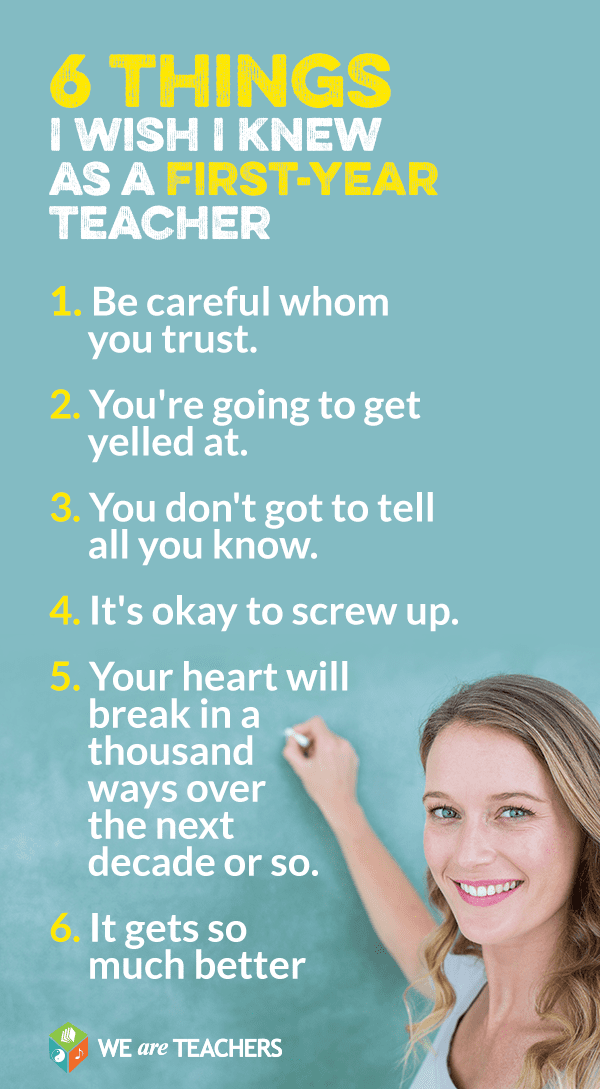I started teaching in 2005, and I thought I knew what I was getting into. Hilarious, right? I’d had good teachers and role models who tried their best to prepare me for a career in education. They told me all the same things they probably told you: You’re here to be their teacher, not their friend. Don’t smile ’til Christmas. (My least favorite teacher saying ever.) Cranberry juice helps prevent a urinary tract infection. But there are a few things they missed, a few things I wish I’d known back in 2005. …
1. Be careful whom you trust.
You’re just out of college and you weren’t in a sorority. You basically hung out with the same 10 or 12 kids for four years and you were all best friends and there was very little gossip or backstabbing. The real world is different, honey-lamb. It turns out that you can’t talk crap about your principal to just anybody, because even at the best, most supportive schools, spies are everywhere. Make sure you get some dirt on them before they get any on you. It’s like Machiavelli up in here. And speaking of principals …
2. You’re going to get yelled at.
And it’s going to suck. Sometimes you’ll deserve it, other times you won’t. Even though the haters will scoff at this, teaching is a fairly high-stress career, for you and for everybody else. People who are stressed take it out on others. So when your principal makes you redo a painstakingly crafted bulletin board because it’s not colorful enough, or when your teacher evaluation centers around the fact that your handwriting on the overhead projector is too big, let it roll like water off a duck’s back. Also, overhead projector? Don’t worry too much about learning how to copy transparencies. That’s not going to be a problem.
3. You don’t got to tell all you know.
You’re going to be surrounded by a special breed of Confederate-flag-wearing ignorance for your first couple of years. Kids will walk out of science class the day they begin learning about evolution. Parents will complain to the (African American) principal that there are too many African first year American teachers at the school. A kid will refuse to read The Lion, the Witch and the Wardrobe, a famous allegory for Christianity, because “Witchcraft’s a sin.”
Here’s the thing, though. You can’t fix all the ignorance. You can maybe teach them what a linking verb is, and hopefully expose them to some literary characters who will expand their perspectives and allow them to see things with new eyes. But you can’t magically transform them into open-minded, intellectually curious people. And don’t blame too much of it on the school or the town, either. Turns out, there are ignorant people in the big city too. Don’t worry. You’ll see.
4. It’s OK to screw up.
You love these kids, I know. You’ll still remember and worry about a whole bunch of them more than 10 years down the road. And you’re going to do things to these kids you love that are unfair and hurtful and wrong, just because you don’t know any better. You’ll jokingly tease a kid about his accent and he’ll suddenly break down in tears in your class. You’ll accuse the wrong kid of stealing someone’s stuff. You’ll call a parent to report some kid’s classroom misbehavior, and she’ll come in the next day with a black eye and bruises. You’ll miss the evidence of sexual abuse that you should have caught.
But you’ll be there. However often you make mistakes and drop the ball and do more harm than good, you’re what they’ve got. And even on your bad days, you will be a constant, loving, well-intentioned presence in their life, doing the absolute best you can to help them. These mistakes are how you learn, and how you become able to help a lot more kids in much better ways later on down the road. Although you’ll still screw up all the time then too.
5. Your heart will break in a thousand ways over the next decade or so.
You’ll work with kids that you love who are caught in impossible situations and you won’t be able to save them. By virtue of being a teacher, you’ll often be complicit in a system that victimizes kids who don’t have a voice to speak up for themselves. You will take your work home with you in the form of papers to grade and endless anxiety about whether your kids are safe and fed and mentally healthy. When you can’t do anything else, praying helps … a little. Drinking helps too, but keep in mind that a margarita has over 500 calories, and maybe stick to screwdrivers instead.
And the heartbreak you feel doesn’t mean something is wrong with you. It means that something is wrong with the world. These kids’ lives are often broken, and you’re doing your absolute, bumbling, never-good-enough best to help them pick up the pieces. Knowing that doesn’t really help, but it’s worth something.
6. It gets so much better.
This first year, you’re figuring out who you are as a teacher. You have to have this “adult” persona that you’ll take off like a corset with a sigh of relief when you get into your car every afternoon. It’s exhausting, pretending to have an authority you don’t feel your first few years. That part gets so much easier.
Eventually, teaching will become part of who you are, and you’ll be able to be yourself in the classroom. It won’t happen right away— it’ll take years—but I promise it will happen. Your teacher identity will no longer feel like an ill-fitting costume, it’ll be more like a pair of those fuzzy socks that look like they’re made of skinned Muppets. You’ll wear that teacher persona more comfortably, and both you and your students will be better for it.
If my mentors had told me all this, the ensuing decade would still have held some shocks. There’s just no preparing for the first time you catch a kid getting amorous with himself during a movie about Helen Keller. But this would have been a good start.
Looking for more support? Check out our Facebook page, exclusively for new teachers!

